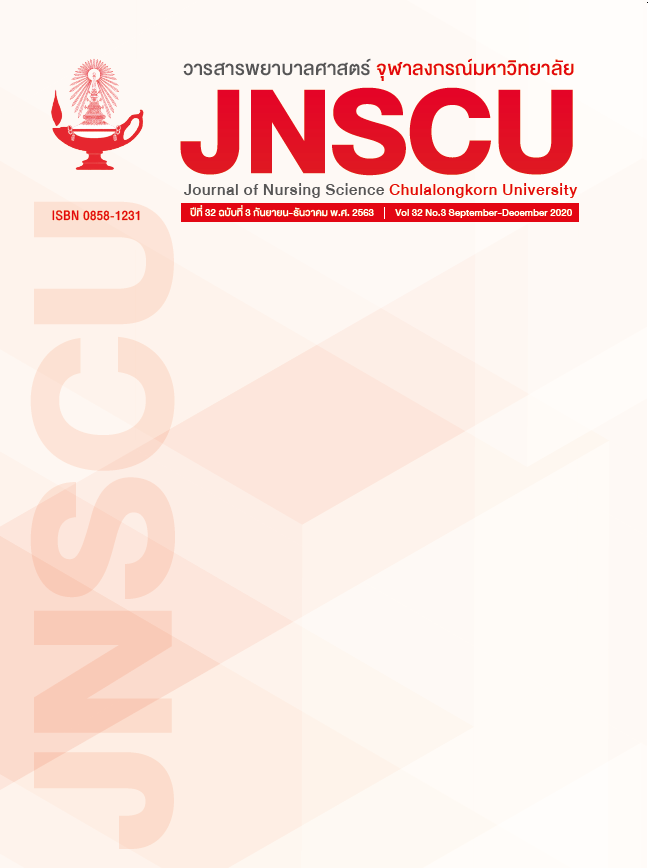ผลของโปรแกรมการเสริมพลังครอบครัวต่อความรู้และทักษะ ในการดูแลผู้ป่วยโรคหลอดเลือดหัวใจ
คำสำคัญ:
การเสริมพลังครอบครัว, ทักษะในการดูแล, โปรแกรม, โรคหลอดเลือดหัวใจบทคัดย่อ
วัตถุประสงค์: 1) เพื่อเปรียบเทียบความรู้และการรับรู้ความสามารถของตนเองในการดูแลผู้ป่วยโรคหลอดเลือดหัวใจระหว่างผู้ดูแลกลุ่มที่ได้รับโปรแกรมการเสริมพลังครอบครัวและกลุ่มที่ได้รับการพยาบาลตามปกติ และ 2) เพื่อประเมินผลทักษะการประเมินระบบหัวใจและหลอดเลือดและการช่วยฟื้นคืนชีพขั้นพื้นฐานของกลุ่มทดลองภายหลังได้รับโปรแกรมการเสริมพลังครอบครัว
รูปแบบการวิจัย: การวิจัยกึ่งทดลอง
วิธีดำเนินการวิจัย: กลุ่มตัวอย่าง คือ ผู้ดูแลบุคคลในครอบครัวที่ป่วยเป็นโรคหลอดเลือดหัวใจในอำเภอเมือง จังหวัดบุรีรัมย์ ซึ่งมีคุณสมบัติตามเกณฑ์การคัดเข้า โดยได้รับการจับคู่ (Matched pair) ตามเพศ อายุ ระดับการศึกษา และใช้วิธีการสุ่มในการจัดกลุ่มเข้ากลุ่มทดลองและกลุ่มควบคุม จำนวนกลุ่มละ 21 คน ผู้ดูแลในกลุ่มทดลองได้รับกิจกรรมจากการเข้าร่วมโปรแกรมการเสริมพลังครอบครัวเป็นระยะเวลา 4 สัปดาห์ เครื่องมือที่ใช้ในการทดลอง ประกอบด้วย โปรแกรมการเสริมพลังครอบครัวที่พัฒนามาจากแนวคิดการเสริมพลังครอบครัวของ Hulme เก็บข้อมูลโดยใช้แบบประเมินความรู้การดูแลผู้ป่วยโรคหลอดเลือดหัวใจ ซึ่งมีค่าความเชื่อมั่นของคูเดอร์-ริชาร์ดสัน (KR-20) ได้เท่ากับ .79 แบบประเมินการรับรู้ความสามารถของตนเอง มีค่าสัมประสิทธิ์แอลฟาครอนบาค เท่ากับ .96 แบบสังเกตและประเมินผลทักษะการประเมินระบบหัวใจและหลอดเลือด และแบบประเมินการช่วยฟื้นคืนชีพขั้นพื้นฐาน มีค่าดัชนีความสอดคล้อง เท่ากับ 1 วิเคราะห์ข้อมูลด้วยสถิติเชิงพรรณนาและสถิติทดสอบที
ผลการวิจัย: 1) ผู้ดูแลในกลุ่มทดลองมีคะแนนความรู้และมีการรับรู้ความสามารถของตนเองในการดูแลผู้ป่วยโรคหลอดเลือดหัวใจสูงกว่ากลุ่มควบคุมอย่างมีนัยสำคัญทางสถิติ .001 และ 2) กลุ่มทดลองสามารถผ่านการทดสอบทักษะการประเมินระบบหัวใจและหลอดเลือด และการช่วยฟื้นคืนชีพขั้นพื้นฐานอยู่ในระดับดี ร้อยละ 100
สรุป: โปรแกรมการเสริมพลังครอบครัวนี้ ช่วยเสริมสร้างทักษะและเพิ่มการรับรู้ความสามารถของผู้ดูแลให้สามารถดูแลผู้ป่วยโรคหลอดเลือดหัวใจได้อย่างมีประสิทธิภาพได้
ดาวน์โหลด
เผยแพร่แล้ว
ฉบับ
ประเภทบทความ
สัญญาอนุญาต

อนุญาตภายใต้เงื่อนไข Creative Commons Attribution-NonCommercial-NoDerivatives 4.0 International License.
##default.contextSettings.thaijo.licenseTerms##


